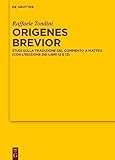Origenes brevior : Studi sulla tradizione del Commento a Matteo (con l’edizione dei libri 12 e 13) / Raffaele Tondini.
Material type: TextSeries: Texte und Untersuchungen zur Geschichte der altchristlichen Literatur ; 193Publisher: Berlin ; Boston : De Gruyter, [2023]Copyright date: ©2023Description: 1 online resource (IX, 452 p.)Content type:
TextSeries: Texte und Untersuchungen zur Geschichte der altchristlichen Literatur ; 193Publisher: Berlin ; Boston : De Gruyter, [2023]Copyright date: ©2023Description: 1 online resource (IX, 452 p.)Content type: - 9783110997866
- 9783110990843
- 230
- BR45 .T4 Bd.193
- online - DeGruyter
- Issued also in print.
| Item type | Current library | Call number | URL | Status | Notes | Barcode | |
|---|---|---|---|---|---|---|---|
 eBook
eBook
|
Biblioteca "Angelicum" Pont. Univ. S.Tommaso d'Aquino Nuvola online | online - DeGruyter (Browse shelf(Opens below)) | Online access | Not for loan (Accesso limitato) | Accesso per gli utenti autorizzati / Access for authorized users | (dgr)9783110990843 |
Frontmatter -- Ringraziare -- Indice dei contenuti -- Ascoltare la voce di Origene: un’introduzione -- 1 Origene in Catene -- 2 L’antica traduzione latina: un fedele tradimento -- 3 Altre fonti di tradizione indiretta -- 4 L’intero e la parte -- 5 L’eretico, l’imperatore e i cardinali: storia della tradizione manoscritta -- “L’esercizio altamente intellettuale di sunteggiare Origene”: conclusione e criteri di edizione -- Ex Origenis in Evangelium secundum Matthaeum commentariorum libris XII et XIII -- Conspectus siglorum -- Τῶν εἰς τὸ κατὰ Ματθαῖον ἐξγητικῶν Ὠριγένους τόμος ιβʹ -- Osservazioni su alcuni loci critici -- Bibliografia -- Indici
restricted access online access with authorization star
http://purl.org/coar/access_right/c_16ec
The Commentary on Matthew is one of Origen’s works we can partially read in Greek language. Nonetheless, this Greek text doesn’t reproduce Origen’s work in its original form but in a later abridgement. The shortened nature of the Greek text is demonstrated thanks to a close comparison with fragments from exegetical catenae (cap. 1) and with an anonymous Latin translation (cap. 2). Particular attention is devoted to a 5th-century palimpsest fragments of the unabridged Commentary (cap. 4). The previous editor of the Commentary tried to restore the original form Greek text by mean of large number of conjectures mainly based on the Latin translation. His results weren’t anyway satisfactory. In this volume the autonomy of the Greek abridgement is reestablished: a sample of this enterprise is offered in the new critical edition of books 12 and 13. This volume offers a comprehensive study of the manuscript tradition of the Commentary on Matthew (cap. 5) and takes into consideration the general process of reduction undergone by Origen’s sometimes verbose production.
Issued also in print.
Mode of access: Internet via World Wide Web.
In Italian.
Description based on online resource; title from PDF title page (publisher's Web site, viewed 06. Mrz 2024)


